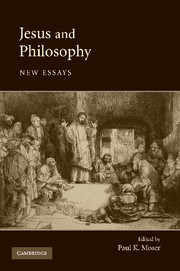Book contents
- Frontmatter
- Contents
- Preface
- Contributors
- Introduction: Jesus and Philosophy
- PART ONE JESUS IN HIS FIRST-CENTURY THOUGHT CONTEXT
- PART TWO JESUS IN MEDIEVAL PHILOSOPHY
- PART THREE JESUS IN CONTEMPORARY PHILOSOPHY
- 7 The Epistemology of Jesus: An Initial Investigation
- 8 Paul Ricoeur: A Biblical Philosopher on Jesus
- 9 Jesus and Forgiveness
- 10 Jesus Christ and the Meaning of Life
- Index
- References
9 - Jesus and Forgiveness
Published online by Cambridge University Press: 05 June 2012
- Frontmatter
- Contents
- Preface
- Contributors
- Introduction: Jesus and Philosophy
- PART ONE JESUS IN HIS FIRST-CENTURY THOUGHT CONTEXT
- PART TWO JESUS IN MEDIEVAL PHILOSOPHY
- PART THREE JESUS IN CONTEMPORARY PHILOSOPHY
- 7 The Epistemology of Jesus: An Initial Investigation
- 8 Paul Ricoeur: A Biblical Philosopher on Jesus
- 9 Jesus and Forgiveness
- 10 Jesus Christ and the Meaning of Life
- Index
- References
Summary
Forgiveness plays a prominent role in our moral culture, as do such institutional analogues of forgiveness as pardon, amnesty, and the decision not to file charges for the sake of personal or social good. The prominence of the role of forgiveness and its analogues in our moral culture does not, of course, imply consensus on that role. Where one parent is willing to forgive the abductor of their child, the other is filled with abiding hatred. And whereas social harmony was the aim of the various truth and reconciliation commissions that emerged in Latin America and South Africa over the past several decades, the pardons and amnesties issued by these commissions themselves became the source of social discord. There are even some who argue that forgiveness and its analogues should play no role whatsoever in our moral culture. Forgiveness is always bad, they say; pardon and amnesty should never be granted. But this remains the view of a minority.
Where do the concept and practice of forgiveness and its analogues come from? As with other components of our moral culture, we should not assume that forgiveness is a component of any moral culture whatsoever. The recognition of rights is not a component of every moral culture, certainly not the recognition of human rights. Perhaps the recognition of obligation, and its counterpart, guilt, is likewise not universal to moral cultures. Conversely, whereas shame is prominent in some moral cultures, it has fallen almost entirely out of ours.
- Type
- Chapter
- Information
- Jesus and PhilosophyNew Essays, pp. 194 - 214Publisher: Cambridge University PressPrint publication year: 2008
References
- 3
- Cited by



